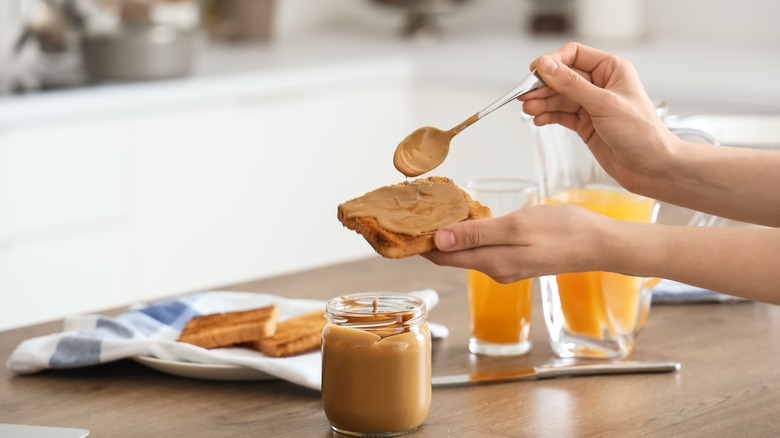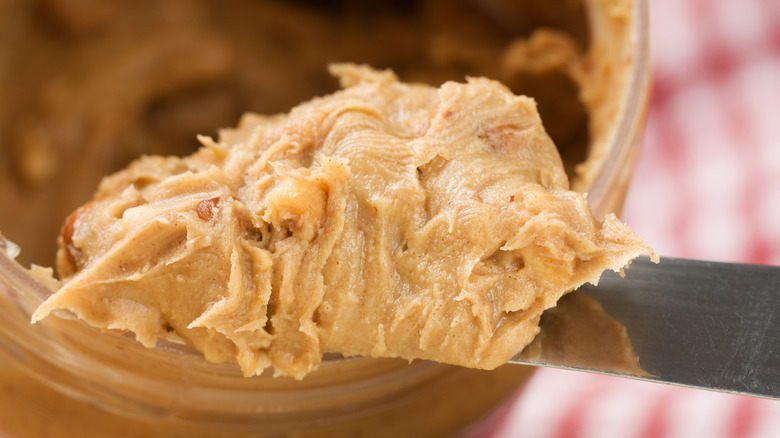The Added Ingredient In Peanut Butter You Should Avoid For Gut Health
Peanut butter is a modern household staple. It's great to spread on toast or to add to smoothies and it's relatively inexpensive, making it a popular choice for when you want to stock up on something that's rich in protein, healthy fats (monounsaturated and polyunsaturated fatty acids), and fiber.
Most people might say peanut butter is one of those creamy or crunchy treats they can enjoy guilt-free and they're right. This nut butter spread is great when it comes to heart health, diabetes risk reduction, cancer prevention, and weight loss, assuming, of course, that you're consuming the stuff in moderation.
But dieticians and scientists are concerned about what happens to your gut health when it comes to one ingredient commonly found in peanut butter — emulsifiers. Emulsifiers are what successfully mix water with oil. Ever wondered what manufacturers use to make peanut butter look and feel smooth and uniform? Yep, that's the work of emulsifiers. In addition to helping things that typically don't mix well come together cohesively, emulsifiers also increase product shelf life. With the progressive focus on gut health, researchers are honing in on this ingredient which is used in many other foods like bread, baked goods, processed meat, chocolate, ice cream, and margarine.
How do emulsifiers affect your gut?
Emulsifiers come in natural and synthetic form. Some come from plants, seeds, fruits, and even eggs, while others are manufactured. Some of the emulsifiers found in foods include polysorbates, sorbitan monostearate, carboxymethylcellulose (CMC), glycerol monostearate (GMS), distilled monoglyceride (DMG), pectin, and lecithin. The studies done so far have been largely focused on animals with a few that have looked at this ingredient's impact on patients with inflammatory bowel disease, or IBD.
Per a 2021 study published in Gastroenterology, the synthetic emulsifier CMC reduced gut diversity in the subjects. The study also found that gut bacteria had started encroaching on the gut lining which could lead to inflammation. Emulsifiers, irrespective of whether they're of natural or chemical origin, were seen to severely impact gut microbiota in a 2020 study published in Frontiers in Microbiology. A 2021 study published in Microbiome found that the emulsifiers CMC and polysorbate 80 had a lasting and seemingly detrimental impact on microbiota composition and function. Lecithin, which is naturally found in egg yolks, was also tested and didn't significantly impact gut bacteria. A 2020 study done on Crohn's patients and published in Nutrients found that participants felt a lot better after avoiding emulsifiers for two weeks.
According to a research fellow at King's College London and founder of The Gut Health Clinic, Megan Rossi, (via The Guardian) who has researched this topic, emulsifiers, "if you think about how they combine water and oil together and turn into this kind of soap, we think that may make the gut lining more vulnerable to penetration of specific inflammatory microorganisms."
Does this mean you have to avoid peanut butter altogether?
Experts don't seem to think that completely avoiding all emulsifiers is possible, considering the fact that a lot of processed foods we consume daily could have the ingredient. Plus, both the U.S. Food and Drug Administration (FDA) and The European Food Safety Authority (EFSA) have approved lists of emulsifiers as safe when consumed in small amounts.
However, some experts are concerned with how these "small amounts" can quickly add up when someone's diet is mainly comprised of ultra-processed foods. The goal may be to scope out the healthiest brands of peanut butter you can eat. There are organic peanut butter options out there that don't contain emulsifiers.
Perhaps, the takeaway could also be about how important it is to focus on whole foods when it comes to your nutrition. Gut health aside, food additives like emulsifiers have been known to affect your cardiovascular health too. "While most people don't need to avoid emulsifiers, eating a healthy diet that prioritizes whole, unprocessed foods most of the time will help you naturally limit your emulsifier consumption," explained Connecticut-based registered dietitian Melissa Mitri to Verywell Health.



